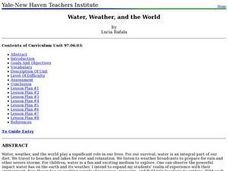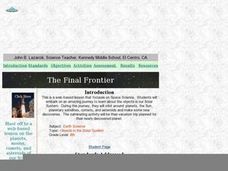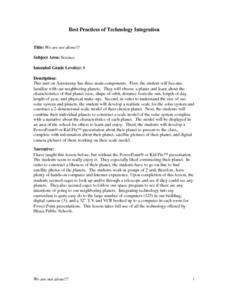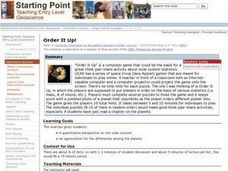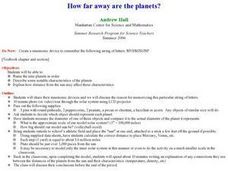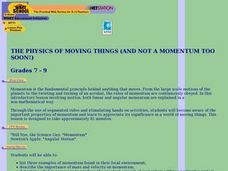Curated OER
Water, Weather, and the World
Students in a special education classroom examine the role of weather and water in their lives. Each day, they add a symbol for the weather outside and identify the proper activities for the weather on that day. In groups, they...
Curated OER
Planetary Profiles
Students explore the characteristics of the planets and moons in the solar system. They create profiles of the nine planets in the solar system and present a written and oral report about a planet.
Curated OER
The Universe
Students describe what scientists mean by an "expanding universe" in their own words. They explain how scientists comprehend the universie is expanding. Students comprehend the vast scale of the universe. They comprehend how theory...
Curated OER
The Drake Equation
Students use the Drake Equation to calculate the probability of sustaining life on various planets. Through the use of the equation, they determine whether intelligent and advanced civilizations can be developed on planets other than...
Curated OER
Voyage of Discovery
Students develop a sense of the scale of our solar system by creating a one to ten billion scale model. They calculate the relative sizes and distances for the planets and asteroid belt using a guiding worksheet. To create the model they...
Curated OER
Planets in Our Solar System
Second graders research climate and landforms on nine planets in our solar system, choose one planet to visit, gather information about their chosen planet's climate and landforms, and "invent" space suit that would enable them to...
Curated OER
What's Your Favorite Planet?
Fourth graders, after listing the nine planets and their differences, choose one planet as their favorite. From the information acquired on each students favorite planet, they make a graph illustrating their favorites and then transform...
Curated OER
Solar System Search
Students research topics related to space and the planets using the Internet. They explore various websites, construct scale models of the solar system, and create a travel brochure using HyperStudio computer software.
Curated OER
We Are Not Alone!!!
Eighth graders explore the area of astronomy. They explore Earth's neighboring planets. Students research a planet's characteristics. They develop a scale model of the solar system and a narrative about the planets.
Curated OER
Planets in a Row
Learners use Internet to research and take notes about each planet for a fact book. They then illustrate each page in the fact book and check their facts with a solar system key. When finished, they display their work and share new facts...
Curated OER
You Are Here
Learners determine the relative size and distance of the planets in the solar system. They use ratios in their mathematical calculations to make models of the planets after discussing the relative sizes of the planets. They keep a...
Curated OER
Order It Up!
Students use the game "Order It Up" an activity about the solar system statistics. The teacher is in the front of a classroom with an Internet-capable computer and a computer projector projecting the game onto the screen. Students have...
Curated OER
Online Planetary Tour
Students develop an interactive presentation about the planets for their fictional interplanetary travel agency. They demonstrate their knowledge of internet research techniques and the Solar System through their interactive planetary...
Curated OER
Etymology
Students tie together planet names with Greek mythology. Students browse thru a dictionary to see where exactly these names came from and what significance they have. Students explore the origins of some English words.
Curated OER
How Far Away Are the Planets?
Young scholars name nine planets in order, describe some notable characteristics of the planets, explain how distance from the sun may affect these characteristics, and create solar system models.
Curated OER
Categorizing Celestial Objects
Students work together to develop a classification system for planets. They take a class vote and read an article about an astronomer's classification system. They write an essay on how scientists make decisions for the general public.
Curated OER
"101 Amazing Earth Facts" Game
Students read for comprehension, work cooperatively to learn "101 Amazing Earth Facts," and compete as teams in a Jeopardy-like game.
Curated OER
Modeling Hot and Cold Planets
Students, in teams, design and construct models of two planets, one hot and the other cold, using a variety of materials. They attempt to create the models out of substances that will actually show the greatest temperature differences...
Curated OER
Development of a Habitable Planet
Students identify and sequence the major events that caused Earth to develop into a habitable planet. They view videos, conduct research, participate in discussions and work in groups to determine the likelihood of other habitable worlds.
Curated OER
WebQuest Solar System Colonization Project 2000
Sixth graders complete a WebQuest to study the names and locations of the planets in the solar system. They investigate the causes of the seasons and the distance between the planets using astronomical units. They use technology to...
Curated OER
THE PHYSICS OF MOVING THINGS (AND NOT A MOMENTUM TOO SOON!)
Students list three examples of momentum found in their local environment; describe the importance of mass and velocity on momentum; and determine what is necessary to produce the greatest amount of momentum within a particular system.
Curated OER
Two Views of the Universe
Students build the two models of the universe created by Aristotle and Copernicus. They compare and contrast the two universes. They create hypothesis on how each model functions.
Curated OER
A Trip To Outer Space: Planet Exchange
Students examine the different planets in outer space. Each class studies a different planet and creates a scavenger hunt for the other classes to explore that planet.
Curated OER
The Solar System
Students examine effects of the sun on the planets in our solar system.


